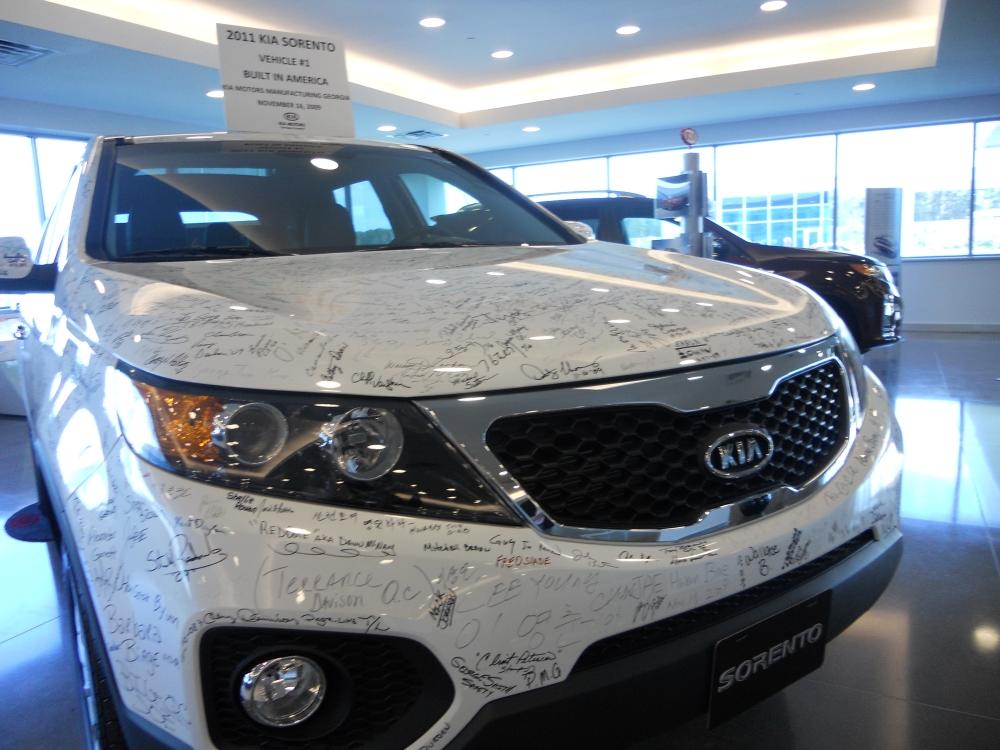
Section Branding
Header Content
Union Workers Sue Over Kia Hiring
Primary Content

When South Korean auto maker Kia Motors decided in 2006 to build its first North American manufacturing plant in West Point, along the Alabama border, it did so thanks to generous tax breaks and other incentives promised by the state.
One of Georgia’s promises was the recruitment and training of workers. The facility now produces 360,000 cars a year and employs 3,000 people. But the way the state helped to hire those workers is now at the center of a lawsuit that could expose a new front in union-breaking activities.
When Sabrina Bolston heard Kia was building a car plant in Georgia, she thought it was the light at the end of the tunnel.
She had worked for a decade at a unionized Ford plant in Hapeville. When it closed in 2006, she lost her job.
The Union City resident applied to Kia three times. But she never even landed an interview. What’s more, Kia didn’t hire any of her former Ford colleagues, who were also part of the union.
“The only thing we had in common was that we all worked there,” she said in an interview. “It couldn’t have been a black thing. It couldn’t have been a white thing. It couldn’t have been a female thing, or an older or a younger thing.”
Bolston and other former autoworkers are suing the state for failing to release records on how it screened applicants. They also say the state conspired to change an open records law to prevent the disclosure of the documents.
As part of Georgia’s incentive package, state technical college officials and Kia executives spent more than a year interviewing 10,000 people to staff the plant.
The lawsuit says that at least 150 former union autoworkers applied. But Kia only hired one person with a union background.
It’s illegal to discriminate against anyone who’s a member of a union. The workers have filed a labor complaint with the National Labor Relations Board, which is pending.
Joel Friedman is a labor law professor at Tulane University in New Orleans. He says the fact that Kia hired almost no former union employees raises some red flags.
“It certainly would be statistically unlikely that it would just so happen that all of the people who were found to be unqualified happened to be people who actually had experience building cars in a unionized setting and that they were rejected not because they had previously been unionized but for some other reason,” he said in a telephone interview.
The plaintiffs filed the lawsuit in December. Then in March, days before the end of the legislative session, state lawmakers inserted a clause in a rewrite of Georgia’s open records law.
It retroactively blocks the release of records about state training programs.
Georgia attorney general Sam Olens wrote the original rewrite. His spokeswoman Lauren Kane defended the process, saying the public could have see the changes to the bill at every stage.
“There were no last-minute changes to the substitute [bill] and anyone who had an interest was perfectly capable of reviewing the draft before the final vote,” she said.
Kia declined to comment on the workers’ complaint, citing the pending litigation.
But some experts say it’s hard to prove that Kia discriminated against the workers because of their labor background. They say Asian auto manufacturers such as Kia often take a different approach than American carmakers, and the company might have wanted to train workers from the ground up.
Bolston, one of the plaintiffs, however, doesn’t buy it.
“You can retrain anyone,” she said. “If you can train the people who you brought in that had no experience at all, what’s the difference in training someone who was already used to the climate, the atmosphere of the auto manufacturing business, the whole thing.”
The plaintiffs are asking a superior court judge to strike the portion of the new open records law related to state training program records.
The state hasn’t responded to that part of the lawsuit.
Tags: KIA, Union, open records law, Kia Motors Manufacturing Georgia, United Auto Workers, Samuel Olens
